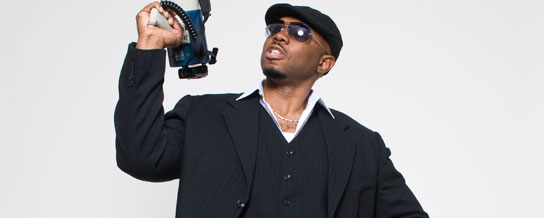MC Zulu: Rebel with a Reason
Chicago’s Dominique Rowland, known as MC Zulu, has a booming baritone voice that almost knocks […]

MC Zulu: Rebel with a Reason
Chicago’s Dominique Rowland, known as MC Zulu, has a booming baritone voice that almost knocks […]

Chicago’s Dominique Rowland, known as MC Zulu, has a booming baritone voice that almost knocks you over. Whether he’s spitting his signature line “Spread the word!” or chatting political lyrics, Zulu’s vocal presence is unmistakable. It’s not just the oral intonation but also his clipped phrases, stopping mid-sentence like a flicking typewriter’s carriage before starting the next line. “Some guy called it reverse sixteenth notes,” explains Rowland of his style of messing with word patterns, which he calls “digital screw.”“There’s no set way [I do it],” he says. “It just has to make sense phonetically and lyrically.”
Fans and labels alike are embracing Zulu’s novel flow, which appears on collaborations with L.A. hip-hop MC Aceyalone, Midwest producer DJ C, San Francisco bhangra-ragga fusionist Kush Arora, and Montreal bass freaker Ghislain Poirier, to name a few. Due to his underground status, Rowland calls himself the White Label Menace. But if recent trends continue, it might not be long before he’s major.
“Zulu is so professional,” says Poirier of their work together. “He has the skills to do subtle things like harmony and superb back-up vocals.” Chicago’s Jake “DJ C” Trussell agrees. “Zulu is one of the most talented ragga vocalists out there today, in the U.S. or anywhere.”
Serious but easygoing, Rowland’s varied life experiences have played a strong role in his artistic development. Born in Panama to U.S.-military parents, Rowland’s family lineage stretches throughout the Caribbean. His family moved to Chicago in the 1980s and settled in a predominantly white neighborhood where ignorant schoolmates derogatorily called the new kid Zulu. The name took on a new meaning after Rowland studied South Africa’s fierce Zulu freedom fighters and was inspired by Afrika Bambaataa’s Zulu Nation, events that sharpened his music’s political content. But Rowland cautions, “I try not to lean [politically] to one side or the other. Fuck all of them, for real.”
Instead, Rowland’s lyrical approach on solo albums like Riddim Killah (Manatee) or the Kush Arora collaboration From Brooklyn to SF (KAM) focuses on putting “bodies in motion” with his innovative dancehall cadence. Overall, Rowland is humble about his role as a ragga ambassador, stating that he’s merely a dancehall-influenced artist. “Jamaicans are the kings of reggae,” he says. “We need to approach [it] with some respect and humility. Americans tend not to do that.”

